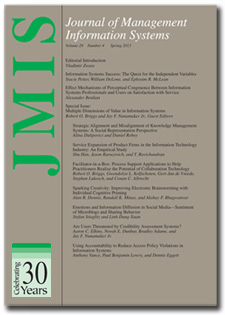人工智能代理作为团队成员:对满意度、冲突、可信度和合作意愿的影响
IF 5.9
2区 管理学
Q1 COMPUTER SCIENCE, INFORMATION SYSTEMS
引用次数: 3
摘要
组织开始部署人工智能(AI)代理作为虚拟团队的成员,以帮助管理信息、协调团队流程和执行简单任务。团队成员如何看待这些人工智能团队成员,他们是否愿意与他们合作?我们进行了一个2 x 2 x 2的实验室实验,操纵团队成员的类型(人类或AI),他们的表现(高或低),以及其他团队成员的表现(高或低)。人工智能团队成员被认为有更高的能力和诚信,但更低的仁慈,这导致在可信度或愿意与他们合作方面没有差异。然而,人工智能团队成员的存在导致了较低的过程满意度。当人工智能团队成员表现良好时,与表现相同的人类团队成员相比,参与者感受到的冲突较少,但当人工智能团队成员表现不佳时,他们感受到的冲突没有差异。没有其他与表现的互动,这表明人工智能团队成员的判断与人类相似,无论其表现如何变化;没有证据表明存在算法厌恶。我们的研究表明,人工智能团队成员很可能被团队接受,这意味着许多旧的协作研究问题可能需要重新审视,以考虑人工智能团队成员。本文章由计算机程序翻译,如有差异,请以英文原文为准。
AI Agents as Team Members: Effects on Satisfaction, Conflict, Trustworthiness, and Willingness to Work With
ABSTRACT Organizations are beginning to deploy artificial intelligence (AI) agents as members of virtual teams to help manage information, coordinate team processes, and perform simple tasks. How will team members perceive these AI team members and will they be willing to work with them? We conducted a 2 x 2 x 2 lab experiment that manipulated the type of team member (human or AI), their performance (high or low), and the performance of other team members (high or low). AI team members were perceived to have higher ability and integrity but lower benevolence, which led to no differences in trustworthiness or willingness to work with them. However, the presence of an AI team member resulted in lower process satisfaction. When the AI team member performed well, participants perceived less conflict compared to a human team member with the same performance, but there were no differences in perceived conflict when it performed poorly. There were no other interactions with performance, indicating that the AI team member was judged similarly to humans, irrespective of variations in performance; there was no evidence of algorithm aversion. Our research suggests that AI team members are likely to be accepted into teams, meaning that many old collaboration research questions may need to be reexamined to consider AI team members.
求助全文
通过发布文献求助,成功后即可免费获取论文全文。
去求助
来源期刊

Journal of Management Information Systems
工程技术-计算机:信息系统
CiteScore
10.20
自引率
13.00%
发文量
34
审稿时长
6 months
期刊介绍:
Journal of Management Information Systems is a widely recognized forum for the presentation of research that advances the practice and understanding of organizational information systems. It serves those investigating new modes of information delivery and the changing landscape of information policy making, as well as practitioners and executives managing the information resource.
 求助内容:
求助内容: 应助结果提醒方式:
应助结果提醒方式:


